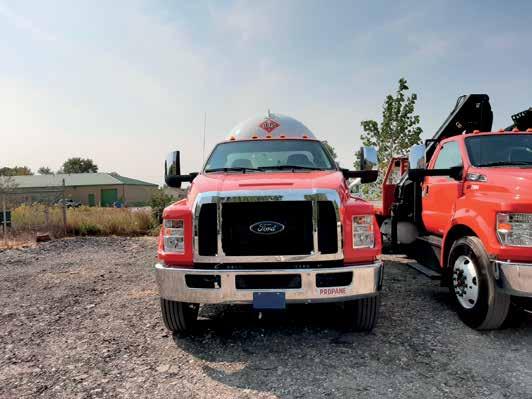
8 minute read
2023-2024 TPGA Board of Directors
President: Allen Wells, Wells Propane, 281-332-2630
President Elect: Larry Baty, Cadenhead Servis Gas, 800-722-8654
Advertisement
Secretary: Harris Baker, HBH Systems, 512-587-8347
Treasurer/Finance Chair: Jeremy Gentile, Hill Butane, 409-296-2001
District 1 Director: David Collett, Gas and Supply, 903-780-2488
District 1 Alternate: Open
District 2 Director: Matt Brock, McAdams Propane, 936-598-7444
District 2 Alternate: Open
District 3 Director: Open
District 3 Alternate: Open
District 4 Director: Danny Meyers, Bellville Butane 979-865-2698
District 4 Alternate: Matt Peterson, Buster Brown Propane, 281-689-3946
District 5 Director: Ryan Tudyk, Howdy Propane Services, 361-771-1900
District 5 Alternate: Open
District 6 Director: Omar Garcia, Mr. G Propane, 956-581-1063
District 6 Alternate: Alex Hinojosa, Hino Gas Sales, 956-423-9178
District 7 Director: Sharon Seal, Bell Hydrogas, 210-533-7103
District 7 Alternate: Open
District 8 Director: Rodney Sladek, Fayetteville Propane, 979-836-7044
District 8 Alternate: Open
District 9 Director: Brad Quisenberry, Gene Harris Petroleum, 817-295-1091
District 9 Alternate: Larry Hearn, Yellow Rose Propane, 870-648-8241
District 10 Director: Josh Nowlin, McCraw Propane, 9003-583-7481
District 10 Alternate: Chad Gregg, Enderby Gas, 940-482-3225
District 11 Director: Steve Adams, Hardwick LPG, 254-647-3402
District 11 Alternate: Open
District 12 Director: Laci Jo Stone, Schneider Distributing, 800-901-9109
District 12 Alternate: Open
District 13 Director: Lane Worthington, WTG Fuels, 432-682-4349
District 13 Alternate: Casey King, WTG Fuels, 432-894-4240
District 14 Director: Terry Perez, Perez Propane, 512-318-9780
District 14 Alternate: Open
District 15 Director: Don Heinrich, Slaton Gas, 806-828-6501
District 15 Alternate: Open
District 16 Director: Mark Garrison, Fred Garrison Oil, 806-296-6353
District 16 Alternate: Open
Past President: Josh McAdams, McAdams Propane, 936-598-7444
Past President: Mark Peterson, Buster Brown Propane, 281-689-3946
Past President: Jack Walzel, Tri-Co Propane, 254-642-3885
Past President: John Walter, Schneider Distributing, 800-901-9109
Past President: Ben Wood, Northwest Propane, 972-247-6121
Vice President: Steve Adams, Hardwick LPG, 254-647-3402
Vice President: Jeremy Gentile, Hill Butane, 409-296-2001
Vice President: Matt Terry, Matador Gas, 210-560-5418
Sr. Vice President: Todd Dorris, Roadrunner Energy, 830-278-2915
Sr. Vice President: Bill Collins, Collins Propane, 972-442-1078
Sr. Vice President: Joe Green, Green’s Blue Flame Gas, 713-462-5414
Assoc. Supplier Service Director: Kirk McGarrah, Cox2M, 713-897-1740
Assoc. Supplier Service Alternate: Open
Assoc. Producer/Marketing Gas Director: Jimmie Grant, Martin Gas Sales, 713-851-6155
Assoc. Producer/Marketing Gas Alternate: Jim Fulton, 4J Energy, 281-728-8567
Assoc. Manufacturer/Distributor Director: Tracy Wells, Gas Equipment Co, 214-683-8018
Assoc. Manufacturer/Distributor Alternate: Joe Ezernack, Meeder Equipment, 903-877-9401
Assoc. At Large Director: John Becraft, Targa Resources, 817-416-7757
Assoc. At Large Alternate: Crystelle Markley, Superior Energy Systems, 512-944-4177
Nominating Chair: Ben Wood, Northwest Propane, 972-247-6121
NPGA Director: Chad Gray, Dixie LP Gas, 254-582-5359
SAVE THOUSANDS ON FUEL REDUCE HARMFUL EMISSIONS
GAIN CREDIBILITY BY USING YOUR OWN FUEL DEPENDABLE TECHNOLOGY
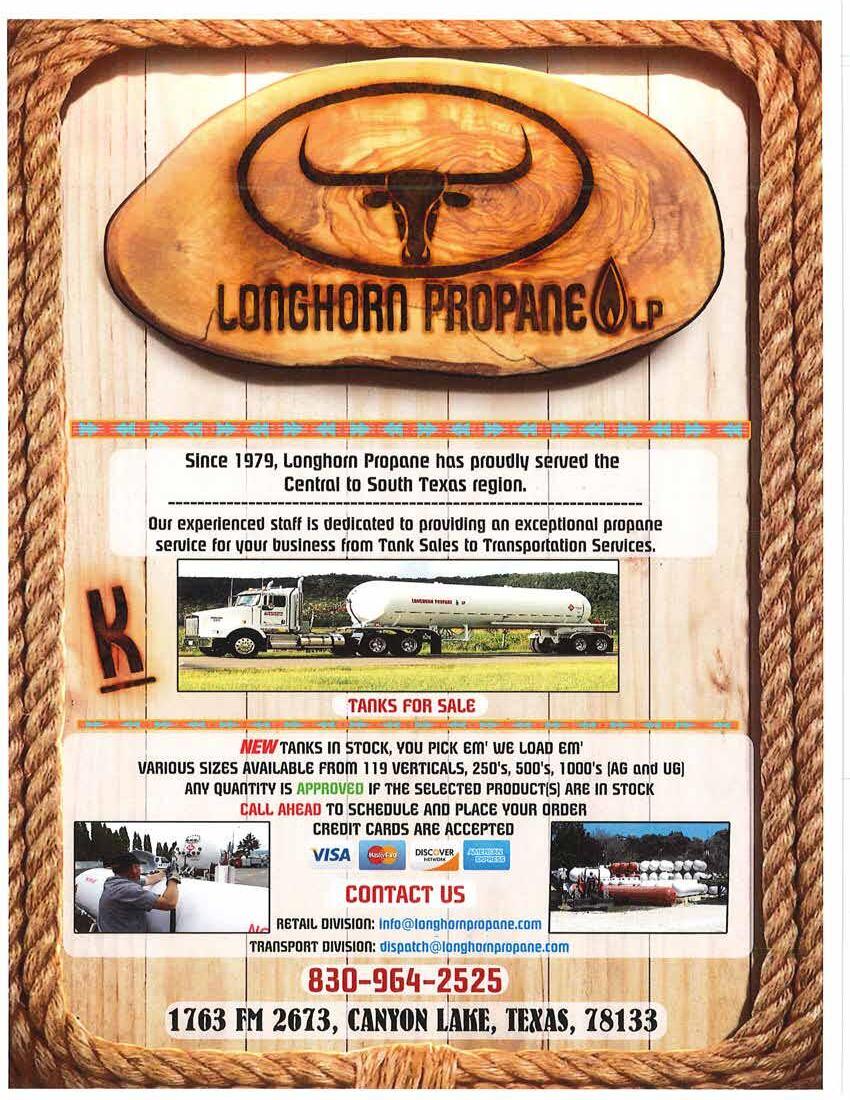
PROPANE AUTOGAS:
Solution for Propane Industry Fleets & Everything You Need to Know
Diesel medium duty vehicles, like bobtails, can only meet EPA and CARB certification levels with complex, expensive technology. These technologies cost even more when you consider investments in wages, maintenance, repairs, and other hidden costs. Propane autogas costs significantly less than diesel (especially these days). Plus, propane autogas vehicles do not require additional fluids, filters, or rigorous maintenance and reduces the most emissions, making it not just great for your customers, but the right solution for your own fleet.
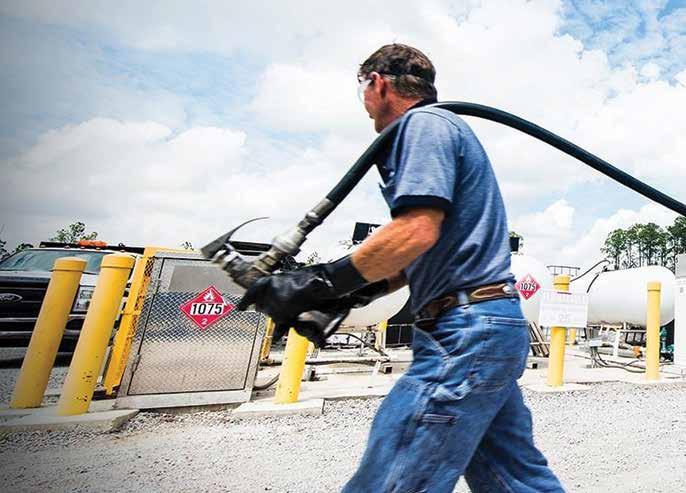
Why Propane?
Many industry fleet owners already understand that propane autogas can generate better savings than other fuels. There are two recent studies by the Propane Education & Research Council (PERC) to back up this claim.
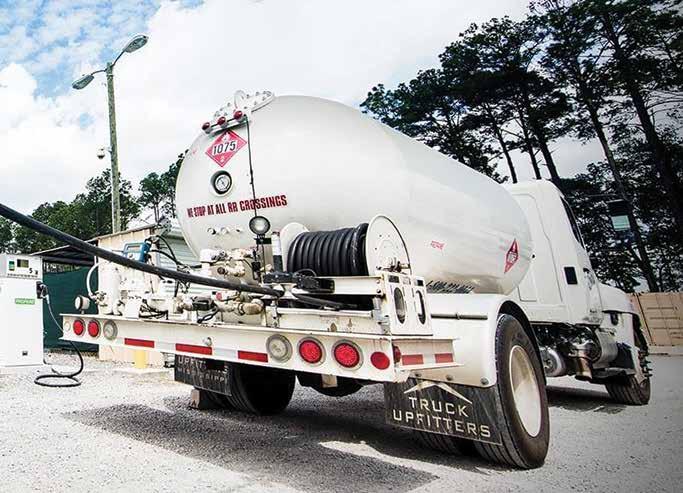
The first study compared data from two industry trucks — one diesel, one propane autogas — in a head to head savings comparison. The report examined two trucks operated by Delta Liquid Energy, a California propane company. The propane vehicle was a 2014 Freightliner S2G 8.0L; the diesel vehicle was a 2014 Freightliner M2 ISL9. Delta tracked and supplied the data for this comparison, and a detailed cost analysis was conducted.
Records were also collected on the preventative maintenance and repairs of the engines and fuel systems. Across the board, the propane autogas truck was better for the company’s bottom line than the diesel model, in terms of fuel and maintenance savings.
The numbers in figure 1 represent the results of the two vehicles on each side of the comparison.
These numbers validate the savings that propane industry fleets can achieve after switching to propane autogas. When multiplied across thousands of miles and an entire fleet of vehicles, the savings add up fast.
While the average total cost-of-ownership data for each truck tells a compelling story about propane autogas savings, a deeper dive into the two vehicles studied reveals the true propane autogas advantage.
In order to accurately account for fluctuating fuel costs from year to year and market to market, an average price per gallon was established using national four-year average fuel prices of diesel and propane autogas. Fuel for the propane autogas vehicle cost the company less than fuel for the diesel vehicle. In fact, the fuel price per mile for propane autogas was less than half of that for diesel. See figure 2.
To compare maintenance costs, all invoices were collected for every preventative maintenance service as well as all engine and fuel system related repairs. This included diesel particulate matter filter replacements and diesel exhaust fluid, as well as propane fuel pump replacements. See figure 3.
A second study looked at the financial outcome when a propane autogas vehicle and diesel vehicle — nearly identical in every way except for fuel — are tracked for cost-of-ownership over their lifecycles.
To make a fair and informative evaluation, four trucks were compared that were similar in almost every way — two propane autogas models and two diesel models equipped with the same body and within just one model year of each other. Data was supplied by Superior Plus Propane in Rochester, New York. Then, a detailed cost analysis was conducted comparing propane autogas Ford F-550 trucks to similar diesel vehicles.
Between 2015 and 2020, the study tracked and compared two important data points:
1) how much fuel the vehicles consumed during their lifecycle, and
2) how many miles they traveled within that timeframe. That produced an accurate miles-per-gallon calculation for each vehicle.
In addition, records were collected on the preventative maintenance and repairs of the engines and fuel systems in order to factor maintenance costs into the equation.
Again, across the board, the propane autogas trucks delivered bottom-line benefits that diesel models couldn’t match — specifically with maintenance and fuel costs.
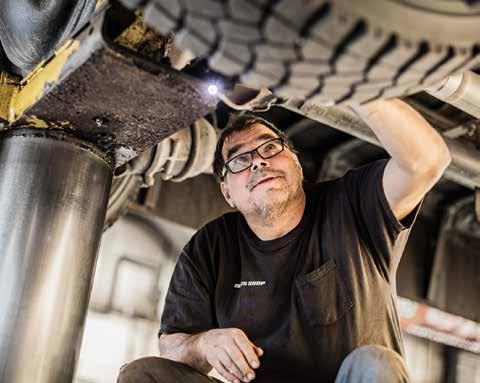
The numbers in figure 4 represent the results of the two vehicles on each side of this comparison over their lifecycle.
Explore Your Options
Propane autogas vehicles for the industry include EPA- and CARB-certified bobtails, service trucks, rack trucks, and other medium-duty vehicles in both OEM dedicated and aftermarket conversions.
Bobtail & Cylinder Exchange
Propane autogas is perfectly suited for the versatile demands of these vehicles, whether you’re running a short route to residential customers or hauling a highvolume delivery to a commercial business.
Flatbed Crain & Tank Set
Safely transport, load, and unload propane cylinders and tanks for your customers without an added trailer or multiple operators.
Maintenance & Service
Propane autogas vehicles ensure your fleet will respond on time, every time, to routine and unexpected maintenance and service calls.
Pickup, SUV, Sedan And Van
Switching to propane autogas will reduce total fuel and maintenance costs, improve vehicle performance, and make your fleet more efficient. EPA-certified bi-fuel systems are available for many new and late model vehicles ensuring your fleet has a choice.
Considering the variety of options available to propane providers, operating your vehicles on propane autogas as the primary fuel is an opportunity you can’t ignore. You’ll not only maintain the efficiency you need for business and lower your total cost-of-ownership, but you’ll show customers how much you trust the fuel. If you've been contemplating a change for your fleet, the time to make the switch to propane autogas is now. What are you waiting for?
Vehicle availability data provided by Propane Education & Research Council (PERC)
BOBTAIL & CYLINDER EXCHANGE
While Freightliner is still offering support and maintenance, it has currently suspended production of the S2G. *Cummins also entering this space and will release a product in in Q2 of 2025.
FLATBED CRAIN & TANK SET
MAINTENANCE & SERVICE
PICKUP, SUV, SEDAN, AND VAN
NEW Propane Autogas Service Network
Propane autogas is the fuel of choice for more than 60,000 vehicles in the U.S., primarily because it boosts profitability by providing fleet owners the lowest total cost-of-ownership of any fuel.
In 2022, the cost of traditional fuels hit record-high levels while propane autogas remained 30-50 percent below the cost of gasoline or diesel. Factor in comparative maintenance and service costs and the total savings vs. diesel registers a whopping 53 percent.
“For propane marketers, the most profit- able way to combat the high costs and poor performance of diesel is to make the switch to propane autogas. Not only will you enjoy the lower fuel costs and total cost-of-ownership, with every trip you’ll be proving to prospective fleet customers just how much you trust our fuel,” says Steve Whaley, PERC’s director of autogas business development.
Yet recent surveys show that more than 90 percent of the propane industry’s roughly 60,000 assorted fleet vehicles run on gasoline or diesel.
Propane autogas vehicles include EPAand CARB-certified bobtails, service trucks, rack trucks, and other medium- duty vehicles in both OEM dedicated and aftermarket conversions. So why aren’t more propane marketers using the product they sell as the primary fuel in their own fleets?
Support and service after the sale is critical to the success of any fleet program. Despite steady advances in vehicle technology, EPA-certified conversion systems, and refueling infrastructure, marketers say the perceived dearth of expertise to service them is a persistent hurdle. But that’s changing.
PERC has been working with vehicle and system manufacturing partners to make information about technical support, replacement parts, training, and service locations more readily accessible to the industry.
A growing network of more than 500 autogas OEM-certified service centers nationwide has been identified on a new, interactive map hosted on PERC’s website at Propane.com/IndustryFleets. Fleet directors can use the map to find the nearest Alliance AutoGas, Freightliner Custom Chassis, ICOM or ROUSH CleanTech facility and contact information.
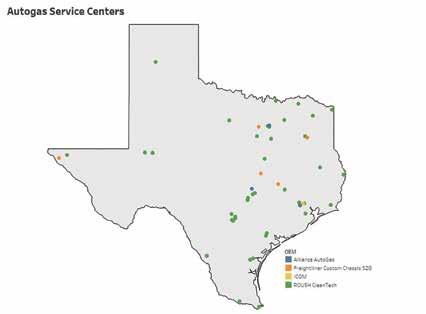
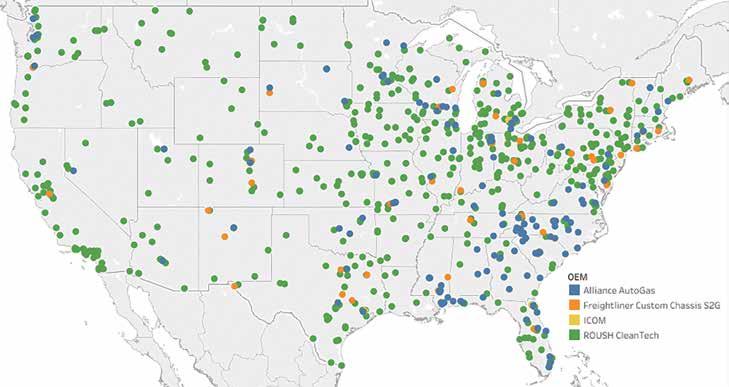
“It’s important to identify and contact a service center in your area before making the commitment to propane autogas for your fleet,“ Whaley says. “This new tool makes it simple to make that vital connection.”
Don’t want to part with your current
Texas Autogas Service Centers
service team? Whaley says OEM propane vehicle solution providers are willing to train and certify additional sites to meet fleet adoption needs.
Meanwhile, PERC is partnering with Cerritos College to add autogas service technician training to its Advanced Transportation Technology & Logistics program lineup. The Los Angeles-based school has been a leader in alternative fuel technology training for 25 years in CNG, hybrids, and electric vehicles.
The partnership will produce basic courses and training resources that focus on theory, operation, general maintenance, safety procedures and protocols of propane autogas.
The training targets both students and existing service technicians. It will be shared with two-year vocational schools and technical colleges nationwide, and also used by OEM partners as a prerequisite to their brand-specific training as a way to grow their service networks.
Explore PERC’s Propane Industry Fleet Vehicle Fact Sheet that covers every available make and model of propane autogas-powered fleet vehicle. You can find it, and other valuable propane autogas resources, at Propane.com/IndustryFleets.
PERC Webinar on Autogas Network
In late February, PERC hosted a new webinar, “Propane Autogas Service Center Network,” as part of its Propane Presents Technology Series to educate marketers about the new map of over 700 dealers and facilities that service propane-powered vehicles, and discussed how to take advantage of other resources to grow their fleets.
During the webinar, PERC’s Steve Whaley, director of autogas business development, was joined by Josh Budworth of Alliance AutoGas and Mario Genovese of Roush CleanTech to discuss the service platforms their companies offer. Jannet Malig of Cerritos College rounded out the panel discussing the organization’s new training program. Every fleet that is adopting autogas for the first time will be provided fuel system training for the fleet staff, local dealer, or local service center of your choice, by the OEM provider.
PERC’s “Propane Presents Technology Series” focuses on new and emerging propane technologies, education, and best practices to approach the ideal customer.
If you’d like to watch the recorded webinar, go to www.propane.com.








